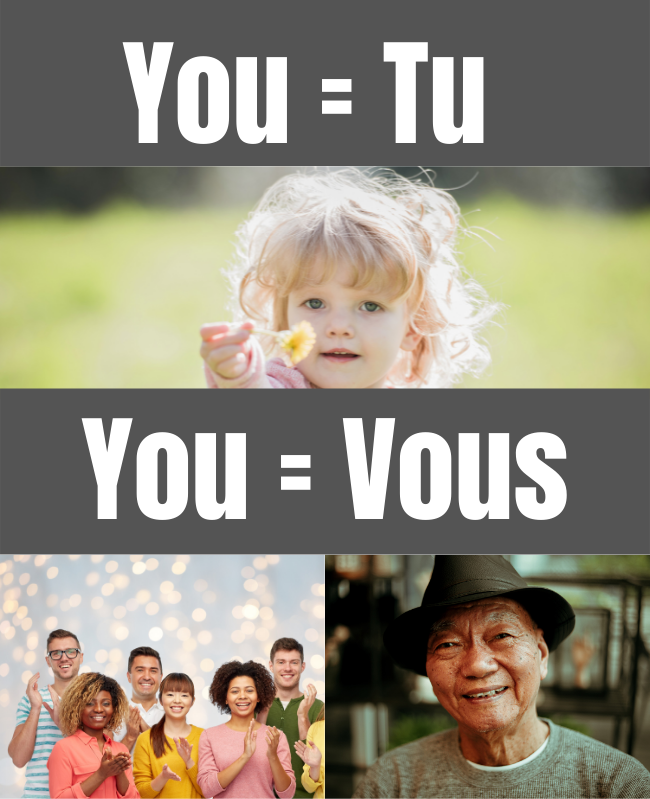There are two ways to say you in French: Tu and vous. Tu is you informal and singular. The French use tu to address friends, good acquaintances and kids. Vous is used for groups of two or more people, strangers and non-acquaintances. In this post, I’ll explain precisely when to use tu and when to use vous. We’ll also look at several other ways of saying “you” in French.
tu / vous
you in French

Tu vs vous: You in French
What does tu mean and what does vous mean?
Basically, there are two ways of saying you in French. This is very tricky for English speakers because we have one simple word: you.
Tu meaning
The word tu means you in the singular, meaning when you’re talking to one specific person. More importantly, tu is the familiar form of you, meaning you use it when you’re talking to somebody you already know (a peer) or somebody who’s younger than yourself.
Vous meaning
Vous is the plural form of you, meaning that you use it when you’re talking to a group of people. It would equate to “you guys” or “ya’all” in the American English.
Vous is also used as the formal you when you’re speaking to a stranger or somebody older than yourself.
When to use vous
A key question is with whom should I use vous?
The answer is simple: Use vous with people who you don’t know and with your elders. This includes anybody who’d you’d meet working in a place of business such as a shop, restaurant, train station, etc.
You should also use vous initially with your French teacher as well as friends and relatives of your French friends.
If you’re working in France you should use vous with your boss, supervisors and with colleagues who you don’t know very well.
While you might be tempted to use tu when you first meet somebody it’s always wise to start with vous.
One really tricky question is which to use with somebody your own age who you meet in a social setting such as a party.
The French will often use vous in these situations and this might seem a bit strange to you as an English speaker.
My suggestion is to just go with the flow and use vous. If you really feel comfortable with the person you could suggest using tu.
When to use tu
There are lots of situations where it would be very awkward to use vous and you’re expected to use tu.
The main one is when talking to kids and adolescents. In French culture if you were to say vous to a child it would appear very strange!
That said, if a child were to use tu with you as an adult and foreign visitor it would appear as very rude and disrespectful.
If you’re speaking to a group of kids you still must use vous because vous means you plural, as mentioned above.

Tutoyer vs vouvoyer: Verbs for talking about you in French
The French actually have specific verbs which describe “call me tu“. The verb for “call me tu” or “say tu” is: “tutoyer“. To tell somebody, “You can use tu with me” say: “Tu peux me tutoyer“.
tutoyer
The verb for “to say vous” is “vouvoyer“. If a young person is inappropriately using “tu” with you you can tell him or her: “Tu dois me vouvoyer!” or “You must say vous to me!”. If you’d like to ask an older person if it’s okay to use “tu” you may ask, “Est-ce que je peux vous tutoyer?“
vouvoyer
Learn tu vs. vous from my mistakes
I’ve goofed up with tu and vous a few times over the years. While these situations seem funny to me now I really did learn a lot from them.
When I first arrived in France in 1992 I met my French host family in the train platform in Douai, France.
When I got off the train and met my host mother for the first time on the platform I asked her, “Comment t’appelles-tu?”, or “What’s your name?” in the tu form.
My mistaken logic for using tu at that time was that since I was going to see her everyday for one year I may as well be friendly from the very start.
However, I was totally unaware that it’s seen as extremely rude in French culture to use tu initially with an older stranger. Nobody said anything that day but at a later date I was told I’d been out of place.

Other important ways of saying you in French
In addition to tu and vous, there are four more other key ways of saying you in French.
Te or t’ as a direct and indirect object pronoun
Both te and t’ are direct and indirect object pronouns and are used to mean “to you” and “at you”. This page covers object pronouns in depth.
Je te regarde.
I look at you. (example of direct object pronoun).
Je te réponds.
I answer you. (example of indirect object pronoun).
In the context of object pronouns (to you, at you), vous is used. In this grammatical situation vous is not a personal pronoun but an object pronoun.
Je vous regarde.
I look at you.
Je vous réponds.
I answer you.
Toi and vous as stressed pronouns
Finally, there are to other important ways of saying you in French. A stressed pronoun (also called disjunctive pronoun) is a personal pronoun that can be proceeded by a preposition such as avec (which).
Je dîne avec toi.
I have dinner with you.
Je dîne avec vous.
I have dinner with you.
Because of the preposition avec, we must you toi and not tu. Furthermore, in this context vous is is a stressed pronoun and not a personal pronoun.

